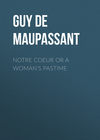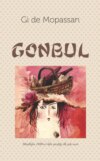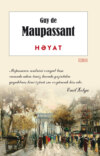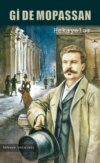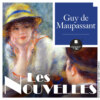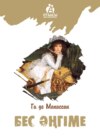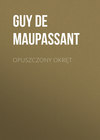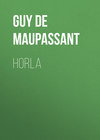Kitabı oku: «Notre Coeur or A Woman's Pastime», sayfa 15
THE OLIVE GROVE AND OTHER TALES
THE OLIVE GROVE
When the 'longshoremen of Garandou, a little port of Provence, situated in the bay of Pisca, between Marseilles and Toulon, perceived the boat of the Abbé Vilbois entering the harbor, they went down to the beach to help him pull her ashore.
The priest was alone in the boat. In spite of his fifty-eight years, he rowed with all the energy of a real sailor. He had placed his hat on the bench beside him, his sleeves were rolled up, disclosing his powerful arms, his cassock was open at the neck and turned over his knees, and he wore a round hat of heavy, white canvas. His whole appearance bespoke an odd and strenuous priest of southern climes, better fitted for adventures than for clerical duties.
He rowed with strong and measured strokes, as if to show the southern sailors how the men of the north handle the oars, and from time to time he turned around to look at the landing point.
The skiff struck the beach and slid far up, the bow plowing through the sand; then it stopped abruptly. The five men watching for the abbé drew near, jovial and smiling.
"Well!" said one, with the strong accent of Provence, "have you been successful, Monsieur le Curé?"
The abbé drew in the oars, removed his canvas head-covering, put on his hat, pulled down his sleeves, and buttoned his coat. Then having assumed the usual appearance of a village priest, he replied proudly: "Yes, I have caught three red-snappers, two eels, and five sunfish."
The fishermen gathered around the boat to examine, with the air of experts, the dead fish, the fat red-snappers, the flat-headed eels, those hideous sea-serpents, and the violet sunfish, streaked with bright orange-colored stripes.
Said one: "I'll carry them up to your house, Monsieur le Curé."
"Thank you, my friend."
Having shaken hands all around, the priest started homeward, followed by the man with the fish; the others took charge of the boat.
The Abbé Vilbois walked along slowly with an air of dignity. The exertion of rowing had brought beads of perspiration to his brow and he uncovered his head each time that he passed through the shade of an olive grove. The warm evening air, freshened by a slight breeze from the sea, cooled his high forehead covered with short, white hair, a forehead far more suggestive of an officer than of a priest.
The village appeared, built on a hill rising from a large valley which descended toward the sea.
It was a summer evening. The dazzling sun, traveling toward the ragged crests of the distant hills, outlined on the white, dusty road the figure of the priest, the shadow of whose three-cornered hat bobbed merrily over the fields, sometimes apparently climbing the trunks of the olive-trees, only to fall immediately to the ground and creep among them.
With every step he took, he raised a cloud of fine, white dust, the invisible powder which, in summer, covers the roads of Provence; it clung to the edge of his cassock turning it grayish white. Completely refreshed, his hands deep in his pockets, he strode along slowly and ponderously, like a mountaineer. His eyes were fixed on the distant village where he had lived twenty years, and where he hoped to die. Its church – his church – rose above the houses clustered around it; the square turrets of gray stone, of unequal proportions and quaint design, stood outlined against the beautiful southern valley; and their architecture suggested the fortifications of some old château rather than the steeples of a place of worship.
The abbé was happy; for he had caught three red-snappers, two eels, and five sunfish. It would enable him to triumph again over his flock, which respected him, no doubt, because he was one of the most powerful men of the place, despite his years. These little innocent vanities were his greatest pleasures. He was a fine marksman; sometimes he practiced with his neighbor, a retired army provost who kept a tobacco shop; he could also swim better than anyone along the coast.
In his day he had been a well-known society man, the Baron de Vilbois, but had entered the priesthood after an unfortunate love-affair. Being the scion of an old family of Picardy, devout and royalistic, whose sons for centuries had entered the army, the magistracy, or the Church, his first thought was to follow his mother's advice and become a priest. But he yielded to his father's suggestion that he should study law in Paris and seek some high office.
While he was completing his studies his father was carried off by pneumonia; his mother, who was greatly affected by the loss, died soon afterward. He came into a fortune, and consequently gave up the idea of following a profession to live a life of idleness. He was handsome and intelligent, but somewhat prejudiced by the traditions and principles which he had inherited, along with his muscular frame, from a long line of ancestors.
Society gladly welcomed him and he enjoyed himself after the fashion of a well-to-do and seriously inclined young man. But it happened that a friend introduced him to a young actress, a pupil of the Conservatoire, who was appearing with great success at the Odéon. It was a case of love at first sight.
His sentiment had all the violence, the passion of a man born to believe in absolute ideas. He saw her act the romantic rôle in which she had achieved a triumph the first night of her appearance. She was pretty, and, though naturally perverse, possessed the face of an angel.
She conquered him completely; she transformed him into a delirious fool, into one of those ecstatic idiots whom a woman's look will forever chain to the pyre of fatal passions. She became his mistress and left the stage. They lived together four years, his love for her increasing during the time. He would have married her in spite of his proud name and family traditions, had he not discovered that for a long time she had been unfaithful to him with the friend who had introduced them.
The awakening was terrible, for she was about to become a mother, and he was awaiting the birth of the child to make her his wife.
When he held the proof of her transgressions, – some letters found in a drawer, – he confronted her with his knowledge and reproached her with all the savageness of his uncouth nature for her unfaithfulness and deceit. But she, a child of the people, being as sure of this man as of the other, braved and insulted him with the inherited daring of those women, who, in times of war, mounted with the men on the barricades.
He would have struck her to the ground – but she showed him her form. As white as death, he checked himself, remembering that a child of his would soon be born to this vile, polluted creature. He rushed at her to crush them both, to obliterate this double shame. Reeling under his blows, and seeing that he was about to stamp out the life of her unborn babe, she realized that she was lost. Throwing out her hands to parry the blows, she cried:
"Do not kill me! It is his, not yours!"
He fell back, so stunned with surprise that for a moment his rage subsided. He stammered:
"What? What did you say?"
Crazed with fright, having read her doom in his eyes and gestures, she repeated: "It's not yours, it's his."
Through his clenched teeth he stammered:
"The child?"
"Yes."
"You lie!"
And again he lifted his foot as if to crush her, while she struggled to her knees in a vain attempt to rise. "I tell you it's his. If it was yours, wouldn't it have come much sooner?"
He was struck by the truth of this argument. In a moment of strange lucidity, his mind evolved precise, conclusive, irresistible reasons to disclaim the child of this miserable woman, and he felt so appeased, so happy at the thought, that he decided to let her live.
He then spoke in a calmer voice: "Get up and leave, and never let me see you again."
Quite cowed, she obeyed him and went. He never saw her again.
Then he left Paris and came south. He stopped in a village situated in a valley, near the coast of the Mediterranean. Selecting for his abode an inn facing the sea, he lived there eighteen months in complete seclusion, nursing his sorrow and despair. The memory of the unfaithful one tortured him; her grace, her charm, her perversity haunted him, and withal came the regret of her caresses.
He wandered aimlessly in those beautiful vales of Provence, baring his head, filled with the thoughts of that woman, to the sun that filtered through the grayish-green leaves of the olive-trees.
His former ideas of religion, the abated ardor of his faith, returned to him during his sorrowful retreat. Religion had formerly seemed a refuge from the unknown temptations of life, now it appeared as a refuge from its snares and tortures. He had never given up the habit of prayer. In his sorrow, he turned anew to its consolations, and often at dusk he would wander into the little village church, where in the darkness gleamed the light of the lamp hung above the altar, to guard the sanctuary and symbolize the Divine Presence.
He confided his sorrow to his God, told Him of his misery, asking advice, pity, help, and consolation. Each day, his fervid prayers disclosed stronger faith.
The bleeding heart of this man, crushed by love for a woman, still longed for affection; and soon his prayers, his seclusion, his constant communion with the Savior who consoles and cheers the weary, wrought a change in him, and the mystic love of God entered his soul, casting out the love of the flesh.
He then decided to take up his former plans and to devote his life to the Church.
He became a priest. Through family connections he succeeded in obtaining a call to the parish of this village which he had come across by chance. Devoting a large part of his fortune to the maintenance of charitable institutions, and keeping only enough to enable him to help the poor as long as he lived, he sought refuge in a quiet life filled with prayer and acts of kindness toward his fellow-men.
Narrow-minded but kind-hearted, a priest with a soldier's temperament, he guided his blind, erring flock forcibly through the mazes of this life in which every taste, instinct, and desire is a pitfall. But the old man in him never disappeared entirely. He continued to love out-of-door exercise and noble sports, but he hated every woman, having an almost childish fear of their dangerous fascination.
II
The sailor who followed the priest, being a southerner, found it difficult to refrain from talking. But he did not dare start a conversation, for the abbé exerted a great prestige over his flock. At last he ventured a remark: "So you like your lodge, do you, Monsieur le Curé?"
This lodge was one of the tiny constructions that are inhabited during the summer by the villagers and the town people alike. It was situated in a field not far from the parish-house, and the abbé had hired it because the latter was very small and built in the heart of the village next to the church.
During the summer time, he did not live altogether at the lodge, but would remain a few days at a time to practice pistol-shooting and be close to nature.
"Yes, my friend," said the priest, "I like it very well."
The low structure could now be seen; it was painted pink, and the walls were almost hidden under the leaves and branches of the olive-trees that grew in the open field. A tall woman was passing in and out of the door, setting a small table at which she placed, at each trip, a knife and fork, a glass, a plate, a napkin, and a piece of bread. She wore the small cap of the women of Arles, a pointed cone of silk or black velvet, decorated with a white rosette.
When the abbé was near enough to make himself heard, he shouted:
"Eh! Marguerite!"
She stopped to ascertain whence the voice came, and recognizing her master: "Oh! it's you, Monsieur le Curé!"
"Yes. I have caught some fine fish, and want you to broil this sunfish immediately, do you hear?"
The servant examined, with a critical and approving glance, the fish that the sailor carried.
"Yes, but we are going to have a chicken for dinner," she said.
"Well, it cannot be helped. To-morrow the fish will not be as fresh as it is now. I mean to enjoy a little feast – it does not happen often – and the sin is not great."
The woman picked out a sunfish and prepared to go into the house. "Ah!" she said, "a man came to see you three times while you were out, Monsieur le Curé."
Indifferently he inquired: "A man! What kind of man?"
"Why, a man whose appearance was not in his favor."
"What! a beggar?"
"Perhaps – I don't know. But I think he is more of a 'maoufatan.'"
The abbé smiled at this word, which, in the language of Provence means a highwayman, a tramp, for he was well aware of Marguerite's timidity, and knew that every day and especially every night she fancied they would be murdered.
He handed a few sous to the sailor, who departed. And just as he was saying: "I am going to wash my hands," – for his past dainty habits still clung to him, – Marguerite called to him from the kitchen where she was scraping the fish with a knife, thereby detaching its blood-stained, silvery scales:
"There he comes!"
The abbé looked down the road and saw a man coming slowly toward the house; he seemed poorly dressed, indeed, so far as he could distinguish. He could not help smiling at his servant's anxiety, and thought, while he waited for the stranger: "I think, after all, she is right; he does look like a 'maoufatan.'"
The man walked slowly, with his eyes on the priest and his hands buried deep in his pockets. He was young and wore a full, blond beard; strands of curly hair escaped from his soft felt hat, which was so dirty and battered that it was impossible to imagine its former color and appearance. He was clothed in a long, dark overcoat, from which emerged the frayed edge of his trousers; on his feet were bathing shoes that deadened his steps, giving him the stealthy walk of a sneak thief.
When he had come within a few steps of the priest, he doffed, with a sweeping motion, the ragged hat that shaded his brow. He was not bad looking, though his face showed signs of dissipation and the top of his head was bald, an indication of premature fatigue and debauch, for he certainly was not over twenty-five years old.
The priest responded at once to his bow, feeling that this fellow was not an ordinary tramp, a mechanic out of work, or a jail-bird, hardly able to speak any other tongue but the mysterious language of prisons.
"How do you do, Monsieur le Curé?" said the man. The priest answered simply, "I salute you," unwilling to address this ragged stranger as "Monsieur." They considered each other attentively; the abbé felt uncomfortable under the gaze of the tramp, invaded by a feeling of unrest unknown to him.
At last the vagabond continued: "Well, do you recognize me?"
Greatly surprised, the priest answered: "Why, no, you are a stranger to me."
"Ah! you do not know me? Look at me well."
"I have never seen you before."
"Well, that may be true," replied the man sarcastically, "but let me show you some one whom you will know better."
He put on his hat and unbuttoned his coat, revealing his bare chest. A red sash wound around his spare frame held his trousers in place. He drew an envelope from his coat pocket, one of those soiled wrappers destined to protect the sundry papers of the tramp, whether they be stolen or legitimate property, those papers which he guards jealously and uses to protect himself against the too zealous gendarmes. He pulled out a photograph about the size of a folded letter, one of those pictures which were popular long ago; it was yellow and dim with age, for he had carried it around with him everywhere and the heat of his body had faded it.
Pushing it under the abbé's eyes, he demanded:
"Do you know him?"
The priest took a step forward to look and grew pale, for it was his own likeness that he had given Her years ago.
Failing to grasp the meaning of the situation he remained silent.
The tramp repeated:
"Do you recognize him?"
And the priest stammered: "Yes."
"Who is it?"
"It is I."
"It is you?"
"Yes."
"Well, then, look at us both, – at me and at your picture!"
Already the unhappy man had seen that these two beings, the one in the picture and the one by his side, resembled each other like brothers; yet he did not understand, and muttered: "Well, what is it you wish?"
Then in an ugly voice, the tramp replied: "What do I wish? Why, first I wish you to recognize me."
"Who are you?"
"Who am I? Ask anybody by the roadside, ask your servant, let's go and ask the mayor and show him this; and he will laugh, I tell you that! Ah! you will not recognize me as your son, papa curé?"
The old man raised his arms above his head, with a patriarchal gesture, and muttered despairingly: "It cannot be true!"
The young fellow drew quite close to him.
"Ah! It cannot be true, you say! You must stop lying, do you hear?" His clenched fists and threatening face, and the violence with which he spoke, made the priest retreat a few steps, while he asked himself anxiously which one of them was laboring under a mistake.
Again he asserted: "I never had a child."
The other man replied: "And no mistress, either?"
The aged priest resolutely uttered one word, a proud admission:
"Yes."
"And was not this mistress about to give birth to a child when you left her?"
Suddenly the anger which had been quelled twenty-five years ago, not quelled, but buried in the heart of the lover, burst through the wall of faith, resignation, and renunciation he had built around it. Almost beside himself, he shouted:
"I left her because she was unfaithful to me and was carrying the child of another man; had it not been for this, I should have killed both you and her, sir!"
The young man hesitated, taken aback at the sincerity of this outburst. Then he replied in a gentler voice:
"Who told you that it was another man's child?"
"She told me herself and braved me."
Without contesting this assertion the vagabond assumed the indifferent tone of a loafer judging a case:
"Well, then, mother made a mistake, that's all!"
After his outburst of rage, the priest had succeeded in mastering himself sufficiently to be able to inquire:
"And who told you that you were my son?"
"My mother, on her deathbed, M'sieur le Curé. And then – this!" And he held the picture under the eyes of the priest.
The old man took it from him; and slowly, with a heart bursting with anguish, he compared this stranger with his faded likeness and doubted no longer – it was his son.
An awful distress wrung his very soul, a terrible, inexpressible emotion invaded him; it was like the remorse of some ancient crime. He began to understand a little, he guessed the rest. He lived over the brutal scene of the parting. It was to save her life, then, that the wretched and deceitful woman had lied to him, her outraged lover. And he had believed her. And a son of his had been brought into the world and had grown up to be this sordid tramp, who exhaled the very odor of vice as a goat exhales its animal smell.
He whispered: "Will you take a little walk with me, so that we can discuss these matters?"
The young man sneered: "Why, certainly! Isn't that what I came for?"
They walked side by side through the olive grove. The sun had gone down and the coolness of southern twilights spread an invisible cloak over the country. The priest shivered, and raising his eyes with a familiar motion, perceived the trembling gray foliage of the holy tree which had spread its frail shadow over the Son of Man in His great trouble and despondency.
A short, despairing prayer rose within him, uttered by his soul's voice, a prayer by which Christians implore the Savior's aid: "O Lord! have mercy on me."
Turning to his son he said: "So your mother is dead?"
These words, "Your mother is dead," awakened a new sorrow; it was the torment of the flesh which cannot forget, the cruel echo of past sufferings; but mostly the thrill of the fleeting, delirious bliss of his youthful passion.
The young man replied: "Yes, Monsieur le Curé, my mother is dead."
"Has she been dead a long while?"
"Yes, three years."
A new doubt entered the priest's mind. "And why did you not find me out before?"
The other man hesitated.
"I was unable to, I was prevented. But excuse me for interrupting these recollections – I will enter into more details later – for I have not had anything to eat since yesterday morning."
A tremor of pity shook the old man and holding forth both hands: "Oh! my poor child!" he said.
The young fellow took those big, powerful hands in his own slender and feverish palms.
Then he replied, with that air of sarcasm which hardly ever left his lips: "Ah! I'm beginning to think that we shall get along very well together, after all!"
The curé started toward the lodge.
"Let us go to dinner," he said.
He suddenly remembered, with a vague and instinctive pleasure, the fine fish he had caught, which, with the chicken, would make a good meal for the poor fellow.
The servant was in front of the door, watching their approach with an anxious and forbidding face.
"Marguerite," shouted the abbé, "take the table and put it into the dining-room, right away; and set two places, as quick as you can."
The woman seemed stunned at the idea that her master was going to dine with this tramp.
But the abbé, without waiting for her, removed the plate and napkin and carried the little table into the dining-room.
A few minutes later he was sitting opposite the beggar, in front of a soup-tureen filled with savory cabbage soup, which sent up a cloud of fragrant steam.
III
When the plates were filled, the tramp fell to with ravenous avidity. The abbé had lost his appetite and ate slowly, leaving the bread in the bottom of his plate. Suddenly he inquired:
"What is your name?"
The man smiled; he was delighted to satisfy his hunger.
"Father unknown," he said, "and no other name but my mother's, which you probably remember. But I possess two Christian names, which, by the way, are quite unsuited to me – Philippe-Auguste."
The priest whitened.
"Why were you named thus?" he asked.
The tramp shrugged his shoulders. "I fancy you ought to know. After mother left you, she wished to make your rival believe that I was his child. He did believe it until I was about fifteen. Then I began to look too much like you. And he disclaimed me, the scoundrel. I had been christened Philippe-Auguste; now, if I had not resembled a soul, or if I had been the son of a third person, who had stayed in the background, to-day I should be the Vicomte Philippe-Auguste de Pravallon, son of the count and senator bearing this name. I have christened myself 'No-luck.'"
"How did you learn all this?"
"They discussed it before me, you know; pretty lively discussions they were, too. I tell you, that's what shows you the seamy side of life!"
Something more distressing than all he had suffered during the last half hour now oppressed the priest. It was a sort of suffocation which seemed as if it would grow and grow till it killed him; it was not due so much to the things he heard as to the manner in which they were uttered by this wayside tramp. Between himself and this beggar, between his son and himself, he was discovering the existence of those moral divergencies which are as fatal poisons to certain souls. Was this his son? He could not yet believe it. He wanted all the proofs, every one of them. He wanted to hear all, to listen to all. Again he thought of the olive-trees that shaded his little lodge, and for the second time he prayed: "O Lord! have mercy upon me."
Philippe-Auguste had finished his soup. He inquired: "Is there nothing else, abbé?"
The kitchen was built in an annex. Marguerite could not hear her master's voice. He always called her by striking a Chinese gong hung on the wall behind his chair. He took the brass hammer and struck the round metal plate. It gave a feeble sound, which grew and vibrated, becoming sharper and louder till it finally died away on the evening breeze.
The servant appeared with a frowning face and cast angry glances at the tramp, as if her faithful instinct had warned her of the misfortune that had befallen her master. She held a platter on which was the sunfish, spreading a savory odor of melted butter through the room. The abbé divided the fish lengthwise, helping his son to the better half: "I caught it a little while ago," he said, with a touch of pride in spite of his keen distress.
Marguerite had not left the room.
The priest added: "Bring us some wine, the white wine of Cape Corse."
She almost rebelled, and the priest, assuming a severe expression was obliged to repeat: "Now, go, and bring two bottles, remember," for, when he drank with anybody, a very rare pleasure, indeed, he always opened one bottle for himself.
Beaming, Philippe-Auguste remarked: "Fine! A splendid idea! It has been a long time since I've had such a dinner." The servant came back after a few minutes. The abbé thought it an eternity, for now a thirst for information burned his blood like infernal fire.
After the bottles had been opened, the woman still remained, her eyes glued on the tramp.
"Leave us," said the curé.
She intentionally ignored his command.
He repeated almost roughly: "I have ordered you to leave us."
Then she left the room.
Philippe-Auguste devoured the fish voraciously, while his father sat watching him, more and more surprised and saddened at all the baseness stamped on the face that was so like his own. The morsels the abbé raised to his lips remained in his mouth, for his throat could not swallow; so he ate slowly, trying to choose, from the host of questions which besieged his mind, the one he wished his son to answer first. At last he spoke:
"What was the cause of her death?"
"Consumption."
"Was she ill a long time?"
"About eighteen months."
"How did she contract it?"
"We could not tell."
Both men were silent. The priest was reflecting. He was oppressed by the multitude of things he wished to know and to hear, for since the rupture, since the day he had tried to kill her, he had heard nothing. Certainly, he had not cared to know, because he had buried her, along with his happiest days, in forgetfulness; but now, knowing that she was dead and gone, he felt within himself the almost jealous desire of a lover to hear all.
He continued: "She was not alone, was she?"
"No, she lived with him."
The old man started: "With him? With Pravallon?"
"Why, yes."
And the betrayed man rapidly calculated that the woman who had deceived him, had lived over thirty years with his rival.
Almost unconsciously he asked: "Were they happy?"
The young man sneered. "Why, yes, with ups and downs! It would have been better had I not been there. I always spoiled everything."
"How, and why?" inquired the priest.
"I have already told you. Because he thought I was his son up to my fifteenth year. But the old fellow wasn't a fool, and soon discovered the likeness. That created scenes. I used to listen behind the door. He accused mother of having deceived him. Mother would answer: 'Is it my fault? you knew quite well when you took me that I was the mistress of that other man.' You were that other man."
"Ah! They spoke of me sometimes?"
"Yes, but never mentioned your name before me, excepting toward the end, when mother knew she was lost. I think they distrusted me."
"And you – and you learned quite early the irregularity of your mother's position?"
"Why, certainly. I am not innocent and I never was. Those things are easy to guess as soon as one begins to know life."
Philippe-Auguste had been filling his glass repeatedly. His eyes now were beginning to sparkle, for his long fast was favorable to the intoxicating effects of the wine. The priest noticed it and wished to caution him. But suddenly the thought that a drunkard is imprudent and loquacious flashed through him, and lifting the bottle he again filled the young man's glass.
Meanwhile Marguerite had brought the chicken. Having set it on the table, she again fastened her eyes on the tramp, saying in an indignant voice: "Can't you see that he's drunk, Monsieur le Curé?"
"Leave us," replied the priest, "and return to the kitchen."
She went out, slamming the door.
He then inquired: "What did your mother say about me?"
"Why, what a woman usually says of a man she has jilted: that you were hard to get along with, very strange, and that you would have made her life miserable with your peculiar ideas."
"Did she say that often?"
"Yes, but sometimes only in allusions, for fear I would understand; but nevertheless I guessed all."
"And how did they treat you in that house?"
"Me? They treated me very well at first and very badly afterward. When mother saw that I was interfering with her, she shook me."
"How?"
"How? very easily. When I was about sixteen years old, I got into various scrapes, and those blackguards put me into a reformatory to get rid of me." He put his elbows on the table and rested his cheeks in his palms. He was hopelessly intoxicated, and felt the unconquerable desire of all drunkards to talk and boast about themselves.
He smiled sweetly, with a feminine grace, an arch grace the priest knew and recognized as the hated charm that had won him long ago, and had also wrought his undoing. Now it was his mother whom the boy resembled, not so much because of his features, but because of his fascinating and deceptive glance, and the seductiveness of the false smile that played around his lips, the outlet of his inner ignominy.
Philippe-Auguste began to relate: "Ah! Ah! Ah! – I've had a fine life since I left the reformatory! A great writer would pay a large sum for it! Why, old Père Dumas's Monte Cristo has had no stranger adventures than mine."
He paused to reflect with the philosophical gravity of the drunkard, then he continued slowly:
"When you wish a boy to turn out well, no matter what he has done, never send him to a reformatory. The associations are too bad. Now, I got into a bad scrape. One night about nine o'clock, I, with three companions – we were all a little drunk – was walking along the road near the ford of Folac. All at once a wagon hove in sight, with the driver and his family asleep in it. They were people from Martinon on their way home from town. I caught hold of the bridle, led the horse to the ferryboat, made him walk into it, and pushed the boat into the middle of the stream. This created some noise and the driver awoke. He could not see in the dark, but whipped up the horse, which started on a run and landed in the water with the whole load. All were drowned! My companions denounced me to the authorities, though they thought it was a good joke when they saw me do it. Really, we didn't think that it would turn out that way. We only wanted to give the people a ducking, just for fun. After that I committed worse offenses to revenge myself for the first one, which did not, on my honor, warrant the reformatory. But what's the use of telling them? I will speak only of the latest one, because I am sure it will please you. Papa, I avenged you!"
